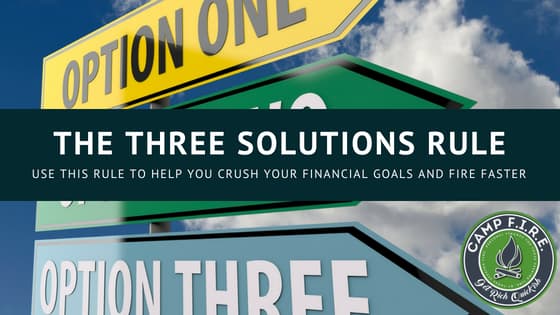
Reach Financial Independence Using The Three Solutions Rule

I’ve been with my current employer for nearly five years now. Throughout that time I’ve held a few different positions, worked on various teams, and had a handful of different managers, but something I learned during my very first week on the job has stuck with me the entire time. I call it the ‘3 Solutions’ rule and I believe it can help all of us reach financial independence.
Find Solutions, Not Excuses
Prior to starting the job I’ve got today I’d been unemployed for the previous 14 months, and that was a dark time for me. But after getting back the saddle I was eager to knock off the rust and prove to my manger that he’d made a good decision by hiring me.
I was still in the on-boarding phase at work when I was given my first assignment. It didn’t take long for me to start poking holes in the project.
I approached my manager one afternoon to show him the flaws that I’d discovered and why this particular project wasn’t really a great idea. Anticipating a solid pat on the back along with an ‘atta boy!’ I was somewhat taken aback at his response:
“Anybody can point out problems, Ty. That’s not what I hired you for. What I need you to do is find solutions to those problems. That’s how we get the job done.”
Anyone Can Spot A Problem
Five years later and I still remember that moment perfectly. My manager went on to explain that he was happy to help whenever I needed it, but he expected me to find no fewer than three solutions to each problem we faced. “Identify the problem, find three solutions for solving it, choose the best one, and then implement it. That’s how you make progress.”
Although this was a workplace lesson for me (which I still use on a daily basis in my job), it can very easily be applied to the world of personal finance as well. And when the 3 Solutions Rule is applied correctly, it will help you reach your financial independence.
I know that not all problems are created equal. Some are incredibly complex and don’t have easy answers, but there are always options. Doing nothing is an option. Not a great one, but an option nonetheless. Complaining about your problem isn’t an option. The harsh reality is that nobody gives a damn about your problems. Most people are too preoccupied with their own issues to listen to you complain about yours.
So stuff the whining and the excuses in a sack. Suck it up and get to work on solving the problem. Here’s how you do it.
Identify the Problem
This is the easy part. The first step in the 3 Solutions Rule is to identify your problem, or opportunity. What’s the problem you’re trying to solve, or the opportunity you’re trying to exploit?
- Do you have extra cash and aren’t sure what to do with it?
- Did you lose your job and need income to pay your bills?
- Are you buried in debt, unable to get ahead financially?
Whatever your problem/opportunity is, you need to identify it. But don’t stop there. For example, many people know they’ve got a debt problem, but what are they doing about it? Just identifying the problem isn’t enough.
“Even if you’re on the right track, you’ll get run over if you just sit there”
Find Three Solutions
Once you’ve identified the problem/opportunity you need to know what your next step is. What you do to solve the problem, or exploit the opportunity, is your strategy. But before you settle on your next move, give yourself at least three options. Sticking with the “too much debt” example, here are three options:
- Do nothing; maintain the status quo
- Earn more money to pay for the debts
- Cut current expenses and use that money to pay off a debt
This list could go on and on because there are a several ways to attack your debt, but let’s go with these three options for now.
Analyze Your Options
Next, you need to pick the option that works best for you. Option #1 (do nothing) isn’t a great option, but you can still choose it. If you truly want to get out of debt, you’ll move along to options 2 and 3.
These options are better than doing nothing, but you still need more details before you can make your decision. If you choose to earn more money, how will you do that? Are you going to ask for a raise? Get a second job? Sell some of your assets and possessions?
And what if you decide to cut expenses? What will be cut? Are the cuts going to be temporary or permanent?
Figure out those detailsule, select the option that’s best for you, implement your decision, and then keep your eyes open for that next problem or opportunity.
Wash, rinse, repeat and reach financial independence the retire early if that’s your goal. That’s it. Using the 3 Solutions Rule has helped me improve my own personal finances, and it can help you improve yours as well.

Chime in!
What do you think about the 3 Solutions Rule? Do you already use it in your personal or professional life? Do you agree that ‘doing nothing’ is an option?